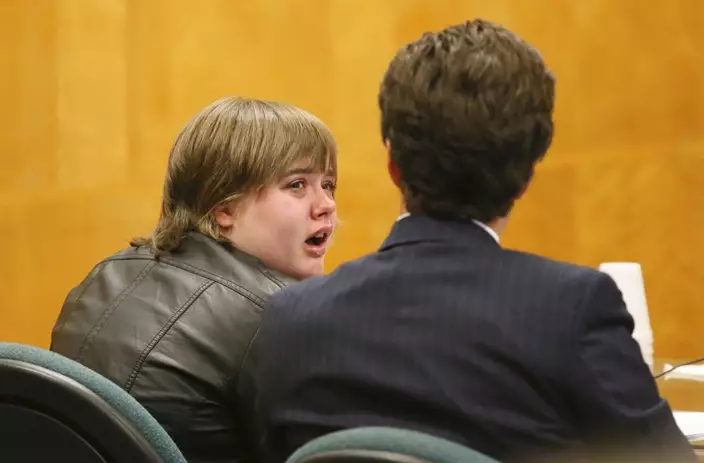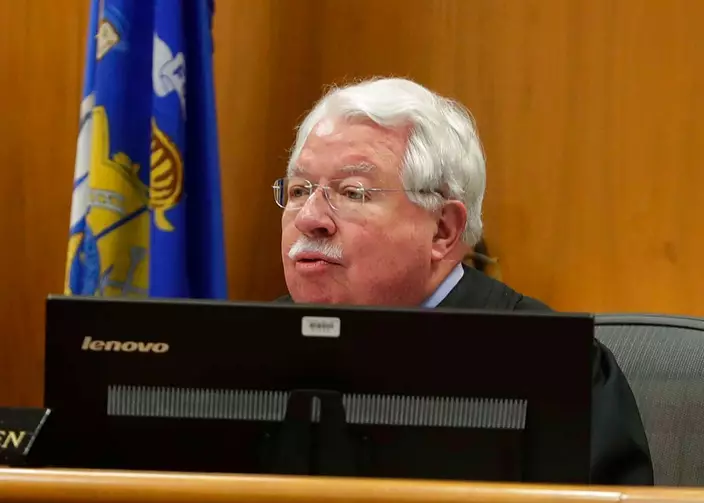A Wisconsin girl who stabbed a classmate to curry favor with the fictional horror character Slender Man will be committed to a mental hospital for 40 years, a judge ordered Thursday, explaining his decision as "an issue of community protection."

FILE - In this Oct. 5, 2017 file photo, Morgan Geyser, left, looks to her attorney Anthony Cotton as she appears in a in a Waukesha County Courtroom in Waukesha, Wis. (Michael Sears /Milwaukee Journal-Sentinel via AP)
Judge Michael Bohren granted the maximum penalty that prosecutors had sought and discounted Morgan Geyser's youth — she was just 12 — at the time of the attack in 2014.
"What we can't forget is this was an attempted murder," Bohren said. Earlier, he heard from four doctors who talked about how Geyser is making progress with her mental illness, to various degrees. But Bohren called the teenager "a fragile person" whose long history suffering from delusions make her a risk to hurt herself and others.

Morgan Geyser, 15, appears for sentencing before Waukesha County Circuit Judge Michael Bohren, Thursday, Feb. 1, 2018 in Waukesha, Wis. (Rick Wood/Milwaukee Journal-Sentinel via AP, Pool)
Geyser, now 15, spoke briefly before she was sentenced, breaking down in tears as she apologized to the girl she stabbed, Payton Leutner.
"I just want to let Bella and her family know that I'm sorry," she said, using a nickname for Leutner. "And I hope she's doing well."
Geyser and another girl, Anissa Weier, admitted that they lured Leutner into some woods near a suburban Milwaukee park. Geyser stabbed Leutner 19 times while Weier urged her on, according to investigators. They left Leutner for dead but she crawled out of the woods and got help from a passing bicyclist. All three girls were 12 at the time.

Waukesha County Circuit Judge Michael Bohren, begins the sentencing phase in the trial of Morgan Geyser, Thursday, Feb. 1, 2018 in Waukesha, Wis. Geyser is one of two girls who tried to kill a classmate with a knife to appease fictional horror character Slender Man. Prosecutors want Geyser to spend the maximum 40 years in a mental hospital for stabbing Payton Leutner in suburban Milwaukee in 2014. (Rick Wood/Milwaukee Journal-Sentinel via AP, Pool)
"Really judge, it's a miracle that Peyton is still with us, that she survived this," said prosecutor Ted Szczupakiewicz.
Geyser and Weier said they carried out the attack to appease Slender Man, a fictional online horror character who they said they feared would otherwise harm them and their families. Slender Man is often typified by spidery limbs and a blank white face.
Weier was sentenced to 25 years in a mental hospital in December. She pleaded guilty in August to being a party to attempted second-degree intentional homicide, but she claimed she wasn't responsible for her actions because she was mentally ill. In September, a jury agreed.
At Geyser's sentencing Thursday, doctors who evaluated her gave conflicting opinions about the type of institutional care she needs and the severity of her continued hallucinations.
Prosecutors presented testimony from a doctor who said Geyser reported still hearing voices from someone named "Maggie" as recently as September.
Dr. Brooke Lundbohm acknowledged that Geyser has made significant progress over the last three years, but said she emphatically believes she is still a danger to herself and others.
"This is not a close call," she said.
Geyser's attorneys argued for her to be moved to a less restrictive facility with children her age and the possibility of being able to be on outings with supervision if she's well enough.
"She has a condition she didn't choose to have," said Anthony Cotton, one of Geyser's attorneys.
They argued in court documents that she suffered from schizophrenia and psychotic spectrum disorder, making her prone to delusions and paranoid beliefs. But three doctors the defense called Thursday said she no longer shows psychotic symptoms and would benefit being in a residential facility where she can socialize with other teenagers. She's currently at a state mental facility with adults and doctors said she is the youngest patient there.
"I believe at the present time she is no more dangerous than any adolescent her age," said Dr. Kenneth Robbins.
Geyser pleaded guilty to attempted first-degree intentional homicide in October in a deal with prosecutors to avoid prison. She may seek conditional release before the 40 years are up.










